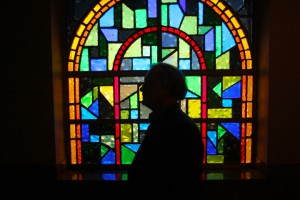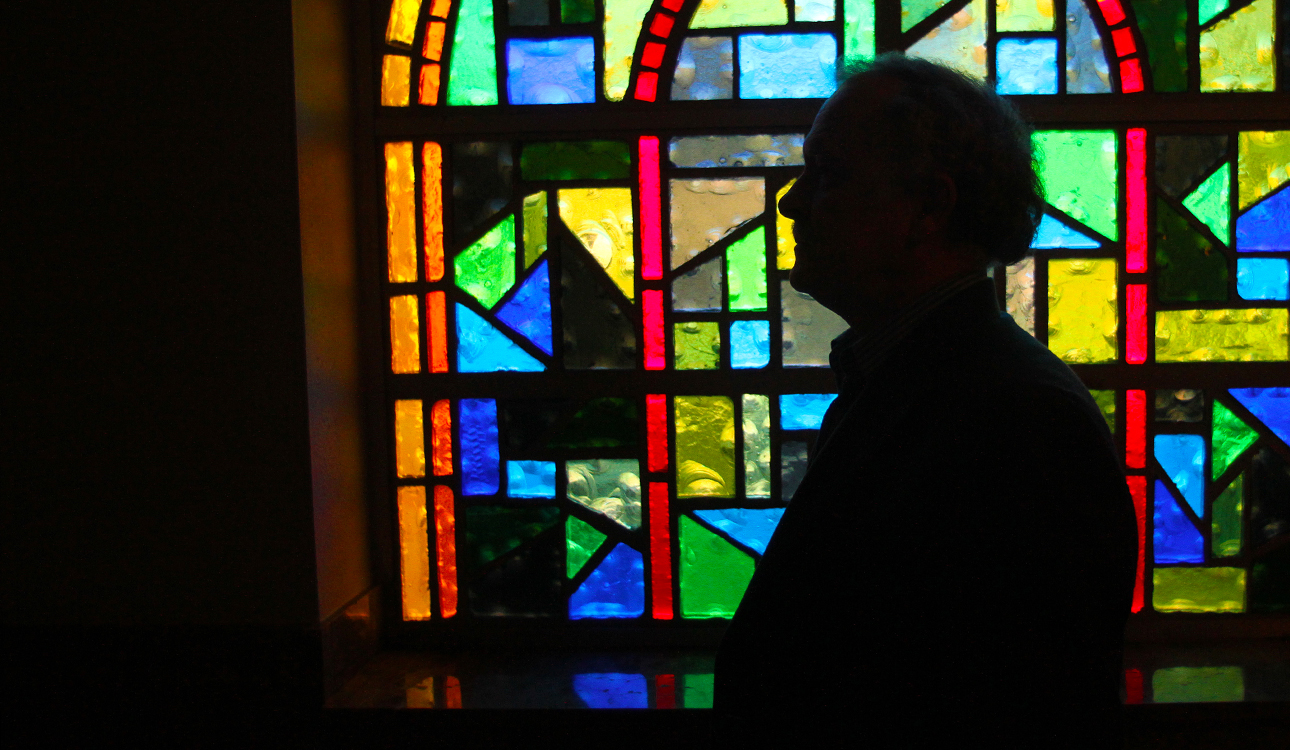
By Caroline Brewton
Editor-in-Chief
He is an intense man with a dynamic speaking style, who makes big, dramatic gestures to underscore his points. In lecture halls, he jumps around the stage, electrifying his audience with the near-manic energy he brings to his passion for teaching. Lynn Tatum is a senior lecturer in the Honors College, teaching mostly religion classes — a subject which he has loved for decades. But religion isn’t the only subject that excites this impassioned professor.
Academic freedom, or the right for a professor to teach, write and research in his or her discipline is important to Tatum. Tatum fights for academic freedom as a member of the national American Association of University Professors (AAUP). He currently serves on the AAUP’s six-person executive committee of the association of state conferences, traveling regularly to speak on academic freedom.
For Tatum, a Baptist, the issue is personal.
“Baptists were born out of dissent,” he said. “And so theologically, I think it’s important that we have the right to disagree, otherwise we’re not real Baptists. So you have to have that space where dissent and conversation can occur.”
But that’s very uncomfortable to some Baptists because of Christianity’s focus on orthodoxy, or correct belief. Many who feel that orthodoxy must be maintained come into tension with openness and inquiry.
Unlike those who believe students should be told what to think, Tatum said he believes professors should teach them how to think for themselves. Free discussion is essential to this process — hence, his belief in academic freedom.
His fascination with academic freedom and its connection to good teaching began when two areas of his own interest collided.
“In the late ‘70s, early ‘80s as Baptists were going through a theological war over, essentially, freedom of thought,” he said.
At the same time, Tatum became fascinated with the Middle East. It was a time when growing fears over the Palestine Liberation Organization had reached a head, and the organization was regarded as a primary enemy of the United States.
“After having lived over in the Middle East, I became convinced it wasn’t black and white, that in fact, these are complex issues, and if we’re going to make any progress there, you’re going to need to have that ability to have a range of opinions and discuss,” Tatum said. “So these two areas of controversy: Middle East studies and religion, had people telling me I shouldn’t say certain things about the Middle East or about religion. And so it absolutely convinced me of the incredible importance of academic freedom.”
Resistance to academic freedom might have several causes, he explained. All new knowledge is, at first, controversial, and those with a vested interest in the old and traditional might resist the transmission of the new. But just because knowledge is new is no reason to shy away from it; in fact, Tatum said he wants others to embrace, discuss and study it.
“When a professor is doing their job in a true atmosphere of academic freedom, you can trust that your professor is telling you the best that they know, not what will a.) get them a raise, or b.) keep them from getting in trouble, or c.) keep them from getting fired,” Tatum said. “And there are people out there who want to see religion professors fired if we’re not teaching exactly the right thing.”
That’s nothing new to Tatum, who says that his no-holds-barred attitude towards openness has caused some to ask for his removal from campus. Once, a local pastor called for his firing and he’s received several angry letters. In one letter, Tatum’s methods were described as “crap.”
“Professing Christians who are in authority […] should not corrupt the minds of young believers,” the letter reads.
Tatum doesn’t see his methods as corrupting anything. In fact, he said he believes exposing students to new ideas, even new ideas that may shock them, is best done in the right environment.
“I think for students to struggle through … is exactly what young Christians need, and our job is not to protect them from dangerous ideas, but to help them work through scary ideas in a setting that’s supportive, at least in my case, taught by a Christian Sunday school teacher, a Bible expert. Where else should students be exposed to these ideas?” he said.
Robert Darden, an associate professor in the journalism, public relations and new media department, echoed Tatum’s sentiments.
“If not a university, then where?” Darden asked. Darden and Tatum are old friends who met after Tatum began teaching at Baylor.
Darden, who believes Tatum is a “prophetic voice on campus,” said he admires Tatum’s championing of academic freedom, which has come at “great personal expense.” In his approach to free discussion, Tatum echoes the guidelines of both the AAUP and journalism, Darden’s own field, he said. Tatum’s students seem mostly pleased with his thought-inspiring methods.
Darden credits this to Tatum’s irrepressible personality.
“He’s a cock-eyed optimist. He’s very funny,” Darden said.
The majority of ratings for Tatum on the popular professor rating site RateMyProfessors are overwhelmingly positive. All ratings on the first page placed him at “Good quality.”
However, despite rating him highly, one student from a religion 1301 class seems to disagree with his teaching style.
“Don’t take him if you are easily offended or don’t know how to defend your Faith,” read the rating, posted on Aug. 2, 2011.
Others disagree. A member of the Baylor Interdisciplinary Core, Tomball junior Sabrina Bosiacki took a class from Tatum in the fall that dealt with the Middle East.
“I think Dr. Tatum was a great teacher because of his dedication to academic freedom, and I was lucky to have been in his class,” Bosiacki said.
She said she felt comfortable in Tatum’s class.
“His teaching style was very effective for the subject material. It helped me learn about the Middle East by thinking about it, rather than just hearing about it,” she said.
Bosiacki, too, said she feels open discussion is crucial to learning — after all, it helped her in class — and that students should be exposed to debate and controversy.
“Students should not be allowed to live in ignorance of certain truths just because the subject was controversial. We all came to college for a reason, and hiding truths to protect the delicacies of some students is wrong,” Bosiacki said.
Like Bosiacki, Tatum said in his own days as an undergraduate, he benefitted from the principles he defends today. Tatum grew up active in his church, he said, and that interest in religion followed him to Baylor, where he received his bachelor’s degree. He decided to study religion because his thinking on the subject had been stimulated by some of his professors.
“I came here, had some fantastic professors in religion that scared the heck out of me,” Tatum said. “They got me thinking about very serious questions that both fascinated and frightened me.”
In ‘74, Tatum went on the very first Baylor in Israel program as the result of a mistake. Originally scheduled to go to the Soviet Union, a trip which fell through, Tatum said he received an offer to go to Israel instead. After a war broke out in Cypress while he was there, the airports in Israel were shut down and he was stuck. A five-week trip turned into a majority of his summer, but Tatum was not upset by the delay.
“I loved it,” he said. “That’s when I confirmed this is what I wanted to study.”
After his graduation from Baylor, Tatum began graduate work at Claremont College before moving on to Duke University. Baylor invited him to come back and teach while he was still finishing his Ph.D., he said.
He only had a bachelor’s degree the first two years he taught, although he finished his dissertation while here. Tatum said he discovered his passion for teaching during that time.
“I actually discovered, really quite by accident, that I was …quite good at it,” he said. “I don’t know anybody who enjoys teaching more than I do.”
For the most part, Tatum said he loves nearly all aspects of teaching, except for grading.
“They pay me to read books, to talk about stuff I want to talk about, and meet with interesting students,” he said. “It’s unbelievable.”
His favorite part?
“Seeing the light go on in a student’s eyes is fantastic. Part of it is autobiographic. I can remember, and I can point to specific classroom experiences where I walked into a classroom, and when I leave forty-five minutes later, I’m different. I had some of those professors,” he said.
“I think occasionally it happens,” he said. “The work is to try to make it a better world. And my job — society pays me in order to produce better human beings. More thoughtful people, more insightful people.”
Tatum said this is important, because those in the job market are looking for those who don’t just have a degree, but have “struggled with issues of right and wrong,” a crucial part of a Baylor education.
“Even in business, what you hope is that Baylor graduates aren’t just looking for the bottom line, because even our business graduates have struggled with issues of right and wrong. I’m part of that tradition. Each of us, a little, bit rubs off this rough edge and that rough edge, and challenges a student to think a little bit … that’s my job. It’s not just about transmitting knowledge,” he said.
Tatum said he encourages students to challenge themselves by asking the hard questions.
“You know the old Socratic phrase ‘The unexamined life is not worth living.’ Well, the unexamined life is just kind of dumb, to paraphrase it,” he said.
Tatum, who said he gets an “adrenaline rush” from a good discussion, said he wants the conversation to spark something in students.
“I think being in a classroom where the conversation is crackling …it hardly gets better than that.”
Indeed.






